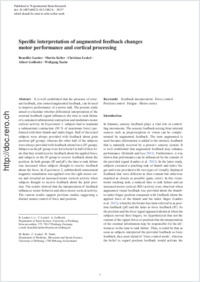Specific interpretation of augmented feedback changes motor performance and cortical processing
- Lauber, Benedikt Department of Sport Science, University of Freiburg, Germany
- Keller, Martin Department of Medicine, Movement and Sports Science, University of Fribourg, Switzerland
- Leukel, Christian Department of Sport Science, University of Freiburg, Germany - Department of Medicine, Movement and Sports Science, University of Fribourg, Switzerland
- Gollhofer, Albert Department of Sport Science, University of Freiburg, Germany
- Taube, Wolfgang Department of Medicine, Movement and Sports Science, University of Fribourg, Switzerland
-
26.03.2013
Published in:
- Experimental Brain Research. - 2013, vol. 227, no. 1, p. 31-41
English
It is well established that the presence of external feedback, also termed augmented feedback, can be used to improve performance of a motor task. The present study aimed to elucidate whether differential interpretation of the external feedback signal influences the time to task failure of a sustained submaximal contraction and modulates motor cortical activity. In Experiment 1, subjects had to maintain a submaximal contraction (30 % of maximum force) performed with their thumb and index finger. Half of the tested subjects were always provided with feedback about joint position (pF-group), whereas the other half of the subjects were always provided with feedback about force (fF-group). Subjects in the pF-group were led to belief in half of their trials that they would receive feedback about the applied force, and subjects in the fF-group to receive feedback about the position. In both groups (fF and pF), the time to task failure was increased when subjects thought to receive feedback about the force. In Experiment 2, subthreshold transcranial magnetic stimulation was applied over the right motor cortex and revealed an increased motor cortical activity when subjects thought to receive feedback about the joint position. The results showed that the interpretation of feedback influences motor behavior and alters motor cortical activity. The current results support previous studies suggesting a distinct neural control of force and positio
- Faculty
- Faculté des sciences et de médecine
- Department
- Département de Médecine
- Language
-
- English
- Classification
- Biological sciences
- License
-
License undefined
- Identifiers
-
- RERO DOC 31940
- DOI 10.1007/s00221-013-3482-8
- Persistent URL
- https://folia.unifr.ch/unifr/documents/303043
Statistics
Document views: 108
File downloads:
- pdf: 185
